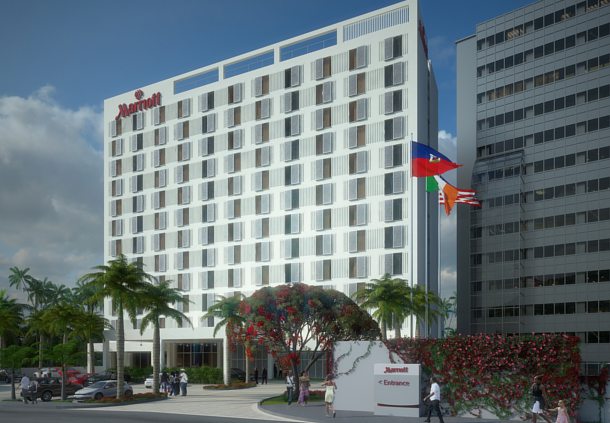GlobalView by Bishop Bill Atwood
It was Spring of 2012; everything imaginable was blooming between the Place de la Concord and the l”Arche de Triomphe. Just off to the North at the intersection of the Champs-Élysées at Rue de la Boetie is one of Marriott Hotel’s flagship properties, the Marriott Champs-Élysées. The hotel General Manager Peter Antinoph was at the pinnacle of his hotel career, but this day, he was getting bad news.
“Cancer. You have about three months to live.”
“I don’t think so,” he replied and set out to get healthy. Now three years later he is in remission and decided that the time had come to give back.
Marriott was going to open a new hotel in Port au Prince, Haiti, one of the poorest countries in the world. “I want to go there,” said Peter.
Haiti was devastated with a tremendous earthquake five years ago. The devastation all over was beyond description. When Peter arrived in Haiti a few months ago, one of his first tasks was to begin the process to hire new staff. One hundred thirty-six people; every possible position. They brought in interviewers from Corporate Headquarters. They advertised, and spread word of mouth around Port-au-Prince. Though it is a huge city, it is remarkably parochial. The gossip telegraph works really well. When they finished the interviews, there were over seven hundred people for one hundred-thirty six jobs, and things were stalled.
So…what to do? Peter had an idea. After the Corporate people left, he took a small team and drove with them out to the tent cities where people had lost everything. He asked, “Who has never worked? Who is handicapped?” He spoke with a woman he saw with six children, “Do you have a job, does your husband have a job?” When the answer was no, he offered her one. He offered other jobs to people who were in the most despicable conditions and circumstances imaginable.
In the end, he filled all the positions. Almost all of them were from the tent cities and the worst areas of the city. Steps were taken to help them with things they needed in order to work. What has happened is that their lives have been changed. As a result, they are intensely loyal. They love their General Manager, and they love their customers. They want to make every detail perfect.
Business-wise, the hotel is doing great. There is nothing like the Marriott property in Port au Prince. It is the clear number one choice for all the business and government workers who are coming to Haiti. And the price? Unlike most developing nations, these new hotel rooms go for $125 a night. All in all, pretty amazing. A hundred thirty-six families lives revolutionized. Amazingly, it has worked wonderfully. They have virtually 100% retention of the staff, and no unusual problems. No one has stolen the swimming pool or walked off with the hotel’s front door… Their experience has been magnificent. It is also challenging to others.
As I left Port au Prince, the hotel was getting ready to welcome about thirty orphans to “camp” at the hotel where they would have projects, fun, swimming, and feasts. Amazing. Imagine the impact on the life of an orphan to be loved like that!
But Haiti is not the only place where there are struggling people. It is certainly one of the most starkly difficult places on the face of the earth, but people anywhere can find themselves in a crushing circumstances. They crop up in every corner of society. Classically, in missiological studies of contemporary culture, there are seven spheres of influence. To my knowledge, these were first articulated by Bill Bright (founder of Campus Crusade, now called CRU), and Loren Cunningham (founder of Youth With A Mission-YWAM).
They spoke about the seven spheres as:
- Government
- Commerce
- Education
- Arts and Entertainment
- Family
- Media
- Religion
A great deal of energy has gone into this model, and I believe it accurately reflects the way things ARE, but I would like to suggest some modification. First of all, one fifth of Western economies are invested in health care and compassion (like aid programs). I would suggest having those ministries of compassion and healing being recognized as a sphere of influence. The current model assumes that health care is in the commerce (or business) area because people pay for services. The reason I don’t think that is adequate, is that the paradigm of making decisions in health care should not primarily be a financial one, but instead, it should include the value placed on human life.
Instead of “religion” just being one of the spheres/mountains/centers of authority, I think God’s design is for the Church to be a platform of transformation that produces indelibly discipled Christians who can be deployed into the spheres of society. When one sees the tremendous impact that Peter Antinoph has made in the world of business (by the way, he is Jewish), my hope is that others can be inspired to work in the sphere in which they function to do the kind of good to which the Kingdom of God calls us.
Our churches should be transformation/discipleship platforms that launch people into every area of human endeavor; people who love God and share His heart for others. Imagine, judges, teachers, shopkeepers, tradesmen, professionals, and others who are so thoroughly transformed that they become agents of good. It is not impossible. It could readily be done—but maybe not without you.
Bishop Bill Atwood is Bishop of the ACNA’s International Diocese and an American Anglican Council contributing author.



